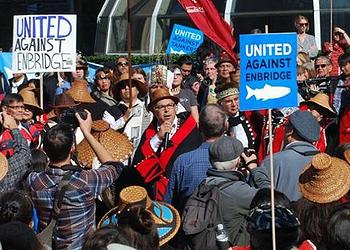
OTTAWA, Ontario, Canada, July 1, 2016 (ENS) – Canada’s Federal Court of Appeal Thursday overturned the permits for Enbridge’s controversial Northern Gateway Pipelines project after the court found that the government of Canada failed to consult the First Nations affected as required by the Constitution.
The majority ruling was signed by two of the three judges on the Appeal Court panel. Judge C. Michael Ryer wrote a dissenting opinion, finding that the government had adequately consulted with First Nations, Canada’s aboriginal people.
The majority ruling states, “We find that Canada offered only a brief, hurried and inadequate opportunity … to exchange and discuss information and to dialogue.”

The decision came in a lawsuit brought by a coalition of seven First Nations, four environmental organizations and one labor union.
“At every turn you’re going, you are seeing nails in the coffin of the Enbridge project,” said Peter Lantin, president of the Council of the Haida Nation, one of the parties that appealed, told the CBC. “I don’t think there’s enough room for another nail in the coffin.”
Lawyer Barry Robinson of the nonprofit legal group Ecojustice, which argued the case before the appellate court, said, “While we are hopeful that this landmark legal victory spells the end of Enbridge’s pipeline once and for all, we cannot let our guard down just yet. The federal government and the company still have 60 days to appeal the Court’s decision.”
Others were more hopeful. “Today’s ruling shows what the people have been saying all along – this pipeline will never be built. This is a victory for our climate, our coast and for First Nation’s communities in determining their own future” said Sven Biggs, of Stand, formerly ForestEthics, one of the coalition groups.
The Enbridge Northern Gateway Pipelines is a project to build a 1,177 kilometre-long twin pipeline from Bruderheim, Alberta to the deep-water port of Kitimat on the northern coast of British Columbia.

The eastbound pipeline would import natural gas condensate and the westbound pipeline would export diluted bitumen from the Athabasca oil sands to the marine terminal in Kitimat for transportation to the Asian markets by oil tankers.
The project would also include terminal facilities with “integrated marine infrastructure at tidewater to accommodate loading and unloading of oil and condensate tankers, and marine transportation of oil and condensate.”
The C$7.9 billion project was proposed in mid-2000s and has been postponed several times. The project would be developed by Enbridge, Inc., a Canadian crude oil and liquids pipeline and storage company.
In June 2014 the Northern Gateway pipeline project was approved by the Canadian government headed by Conservative Prime Minister Stephen Harper, subject to 209 conditions.

Upon taking office in 2015, the new Prime Minister, Liberal Justin Trudeau, imposed a ban on oil tanker traffic on the North Coast of British Columbia, putting a nail in the project’s coffin.
Northern Gateway President John Carruthers said in a statement that Enbridge will consult with Aboriginal groups, but is still committed to the project and “protecting the environment and the traditional way of life of First Nations and Métis peoples and communities along the project route.”
Their traditional territory includes the waters that would be used by tankers, the Kitimat terminal and some of the land the pipeline would cross.
The Appeal Court ruling says the standard for consultation is whether “reasonable efforts to inform and consult were made.”
The majority ruled that this standard was not met, stating, “The inadequacies – more than just a handful and more than mere imperfections – left entire subjects of central interest to the affected First Nations, sometimes subjects affecting their subsistence and well-being, entirely ignored.”
Copyright Environment News Service (ENS) 2016. All rights reserved.
© 2016, Environment News Service. All rights reserved. Content may be quoted only with proper attribution and a direct link to the original article. Full reproduction is prohibited.
